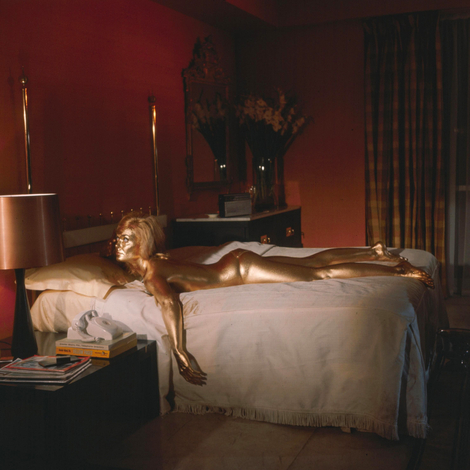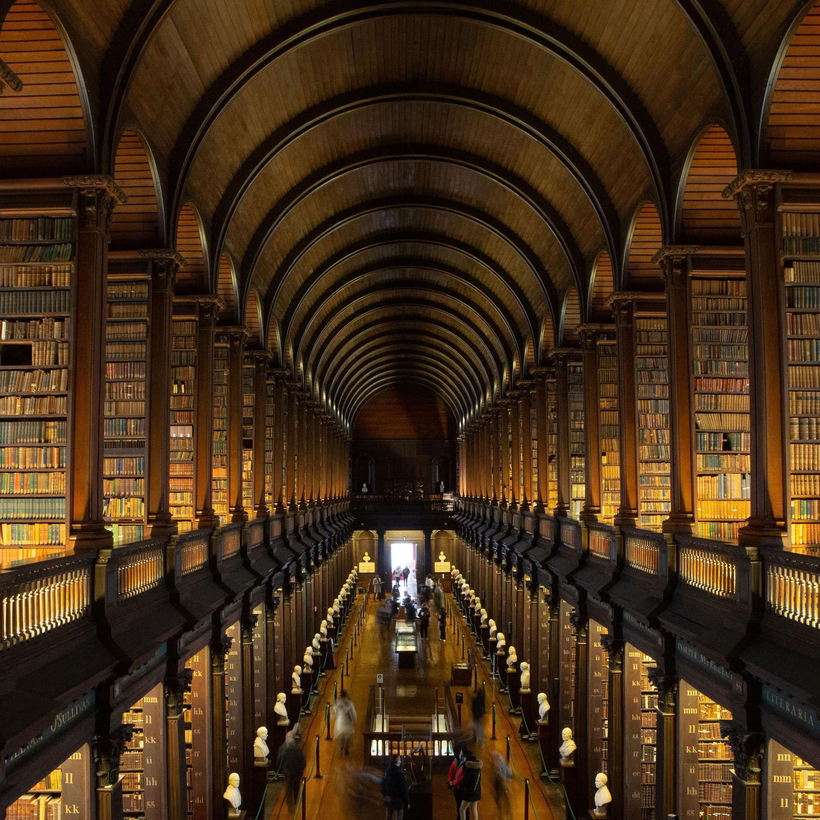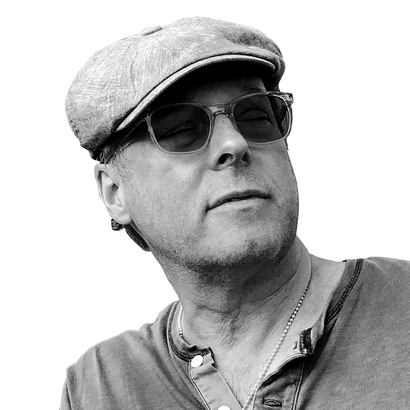You can’t get far in Dublin without banging into some literary giant.
Passengers arriving at the airport are confronted by a billboard asking, “Isn’t there the light of seven heavens in your heart alone … ?” The floor-to-ceiling quote from J. M. Synge’s The Playboy of the Western World is among the giant P.S.A.’s (Poetic Service Announcements) that point visitors toward Ireland’s soul in the way most airports direct you to the baggage carousel.
A bard lurks around every corner. There’s Oscar Wilde—Danny Osborne’s louche sculpture of him—lounging in his smoking jacket on a boulder in Merrion Square. There’s John Coll’s bronze embodiment of Brendan Behan, sitting on a bench on the Royal Canal, conferring with a blackbird.

You can steep yourself in the city’s literary history any day of the year—genuflect before the illuminated Book of Kells in Trinity College’s cathedral-like library, decipher the private scribbling of Edna O’Brien and Samuel Beckett at the Museum of Literature Ireland (MoLI), and finish with a crawl through the same pubs that lubricated your favorite sentence-slingers.
But if you’re looking to commune with eminent writers, there’s no better time in Dublin than June. Not only is the weather clement, but two great literary festivals are packed into one week.
June 16 marks the 120th anniversary of the day in 1904 on which the ad peddler Leopold Bloom and the aspiring poet Stephen Dedalus navigate the city in James Joyce’s Ulysses. Two years after the 1922 publication of his reviled and revered novel, Joyce made mention in a letter of “a group of people who observe what they call Bloom’s day.”
Bloomsday picked up steam in 1954 when five lettered men—Brian O’Nolan, Patrick Kavanagh, John Ryan, Anthony Cronin, and A. J. Leventhal—hired two horse-drawn carriages to retrace the peregrinations of Bloom and Dedalus. Joyce’s dentist cousin, Tom, also came along. Today, 14 sidewalk plaques guide the faithful along the story’s route.
Where to start? Devoted readers often greet the day at the Martello tower in the coastal suburb of Sandycove. Now known as the James Joyce Tower and Museum, it’s where Joyce, like his alter ego, Dedalus, lived for a bit in 1904 and where Ulysses begins. Some take a morning swim nearby, as Dedalus’s tower-mate Buck Mulligan does, in the “snotgreen,” “scrotumtightening” Irish Sea. Others fortify themselves, à la Bloom, with a hearty breakfast of grilled kidneys.

Next up: Sweny’s Pharmacy. The retired apothecary still dispenses the bars of lemon soap Bloom favored, as well as books and curios. Mostly, it’s an urgent-care center for people who need to hear Joyce’s words read aloud. You’ll find many dressed in Edwardian style—women in long, ruffled skirts, men in bowlers or boaters.
Move on to another reading at Hodges Figgis, one of the world’s oldest bookstores. (Joyce, one of its loyal customers, sent Dedalus there to ogle a saleswoman). From there, it’s off to Davy Byrne’s, the “moral pub” where you can order what Bloom had—a glass of burgundy and a gorgonzola sandwich.
You can cobble together your own odyssey. Alex Leslie has put together a helpful Baedeker of places mentioned in Ulysses, and Pat Liddy and his team of guides do private and group walking tours. The Balloonatics Theatre Company, now in its 40th year, performs scenes from the novel at different sites throughout the day.
The core of the 2024 Bloomsday Festival runs from June 11 to 16, but Joyce events span the month and typically include theater, music, dance, art, photography, and film components. The James Joyce Centre (worth a visit) provides a schedule.

Some may see Bloomsday simply as a boozy costume party. But it’s Joyce’s brilliance that intoxicates most of the revelers. Conner Habib, who was the host of the Ulysses—for the Rest of Us! online book club, likens Joyce’s prose to a “psychoactive substance” that lures readers to Dublin for “further immersion into that experience.” Kelly Bryan, co-host of the Blooms & Barnacles podcast, agrees that “the hallucinatory parts are interesting,” but “the social aspect will always draw more crowds than the cerebral.”
If you’re coming for Bloomsday, it pays to also explore the Dalkey Book Festival, which runs from June 13 to 16. About 30 minutes south of the city center, Dalkey has its own connection to Joyce, whose time spent teaching in the Dublin suburb will be marked by a couple of Bloomsday events there. Other writers, including Beckett, O’Nolan, and George Bernard Shaw, also had ties to Dalkey (pronounced dawkee). In recent years, filmmakers such as Jim Sheridan and Neil Jordan have settled there.
Despite its cultural pedigree, Dalkey was feeling the recession in 2010. That’s when one of its residents, economist David McWilliams, wrote a column encouraging his fellow citizens not to wait for the government to fix things. McWilliams’s wife, Sian Smyth, recalls, “David and I looked at each other and said, What are we going to do?”
Hoping to entice outsiders to spend some money in town, they launched a book fair. They cautiously approached their neighbors, who fortunately included some best-selling authors. “I first went to Maeve Binchy,” Smyth tells me. “I was quite intimidated. But she said of course she would come. She said, ‘Why don’t I ask a couple of other writers for you?’”
At first, the festival specialized in Irish literature. “I couldn’t believe it when Seamus Heaney turned to me and asked if he could read a few more poems,” Smyth says.
As the years went on, the couple brought in more non-Irish, nonfiction authors, along with politicians, scientists, historians, and performers. Malcolm Gladwell, Bernie Sanders, Carl Bernstein, Jony Ive, Brian Eno, Bob Geldof, Stephen Fry, Michael Gambon, Richard Ford, Roddy Doyle, Marlon James, Colum McCann, and Michael Ondaatje are a few of the people who’ve batted around big ideas. Salman Rushdie has called Dalkey “the best little festival in the world.”

Today, you wouldn’t know a recession had ever troubled Dalkey. Its flower-trimmed main lane is lined with boutiques and a dozen restaurants offering every kind of cuisine. There are also the remnants of two 14th-century Norman castles. Michelle Obama has lunched at Finnegan’s. Matt Damon and family weathered the pandemic in the storybook village.
At last year’s festival, Tom Hanks came to push his first novel, The Making of Another Major Motion Picture Masterpiece. Appearing in an 11th-century church, Hanks delivered a jovial homily in which he aped Humphrey Bogart, Michael Curtiz, Ron Howard, and Abbey Theatre director Vincent Dowling, who once told young Tom, “I think you could be an actor.”
Smyth and McWilliams still do hit up the locals when needed. Last year, they asked a Dalkey homeowner named Bono if he’d talk about his new memoir with Irish Times columnist Fintan O’Toole, who’d also just hatched an autobiography. The U2 frontman explained that he wrote “to know the world better a bit, but mostly it’s just narcissism.” Indeed, Bono ventured, he’d taken “navel-gazing to a whole new level.”
This year’s 77 Dalkey sessions are due to feature more than 100 speakers, including journalists Christiane Amanpour, David Brooks, and Jeremy Bowen, actors Henry Winkler, Stephen Rea, and Barry McGovern, director Neil Jordan, novelists Paul Lynch, Colm Tóibín, and Paul Murray, and comics David Baddiel and Paul Howard.
Tickets can go fast.
The Bloomsday Festival runs from June 10 to June 16. The Dalkey Book Festival runs from June 13 to June 16
George Rush has contributed to Vanity Fair, Esquire, Rolling Stone, The New York Times, and The Wall Street Journal. He and his wife, Joanna Molloy, wrote the syndicated Rush & Molloy column for the New York Daily News


